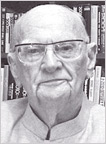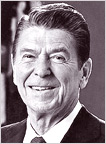|
Arthur C. Clarke’s Vision for Peace in Outer Space -
Part II:
‘No’ to Star Wars
Prof. G.T. Francis de Silva Former Vice Chancellor,
University of Moratuwa
In 1975, Arthur was invited to address the US House of Representative
Committee on Space Science and Applications, chaired by Don Fuqua. His
and other hearings were later published as three volumes, Future Space
Programmes 1975. Quoting from a futuristic character in one of his
novels he implied that war fronts will move to the space.
 However, the person from future in the story said “The age of
conflict between nations is over.” but he cautioned that challenges have
to be met. He proposed that emphasis should be placed on educational
satellites and not simply communication satellites. Some of the other
space innovations he described were world weather watch, Landsats to
gather geographical information, Space Laboratories and Telescopes, not
necessarily manned, Space Hospitals. In simple terms what Arthur wished
for were all peaceful purposes from activities in space. However, the person from future in the story said “The age of
conflict between nations is over.” but he cautioned that challenges have
to be met. He proposed that emphasis should be placed on educational
satellites and not simply communication satellites. Some of the other
space innovations he described were world weather watch, Landsats to
gather geographical information, Space Laboratories and Telescopes, not
necessarily manned, Space Hospitals. In simple terms what Arthur wished
for were all peaceful purposes from activities in space.
Americans appear to be the first to take military activities to space
as in 1955, President Dwight D. Eisenhower is supposed to have secretly
approved a highly classified military spy satellite, code named Corona.
In March 1983, US President Ronald Reagan proposed setting up a
project termed Strategic Defense Initiative (SDI) to establish an earth
and space based anti missile system to counter any possible
intercontinental Ballistic Missile (ICBM) attacks. Next day itself
Senator Edward Kennedy called it an undesirable ‘Star wars’ project that
will destabilize peace on earth.
Sri Lankan delegation
This name taken from George Lucas’ famous film of 1977 became
synonymous with this project. Many scientists and statesmen opposed the
Star Wars Project as it will escalate the arms race into outer space,
waste resources for an uncertain outcome and militaries the hitherto
peaceful frontier of space.
In August 1982, Arthur was a Sri Lanka delegate, to the second UN
Conference on the Exploration and Peaceful Uses of Outer Space, held in
Vienna. His speech ‘Space Flight - Imagination and reality’,
intentionally avoided any politically sensitive issues, but before
leaving the podium he did quote a well known phrase from his book
Prelude to space ‘We will take no frontiers into space.’
 |
 |
| Sir Arthur
C. Clarke |
Ronald
Reagan |
Later he had lunch with US, Soviet and Chinese ambassadors. Back in
Sri Lanka he was delighted to learn that his speech has been placed in
the US Congress by Congressman George Brown.
His biographer Neil McAleer states that Arthur was against Star wars
concept.
During this period Arthur attended the UN Conference on Disarmament
(CD) Geneva which was then the exclusive club of forty UN member states
who negotiated disarmament treaties for the world. Sri Lanka had the
privilege of being one of the members and Arthur joined the Sri Lanka
delegation to that Conference which is still known as the sole
multilateral negotiating body of the UN on disarmament. Arthurs
presentation to the CD on behalf of the Sri Lankan delegation proved to
be a catalyst for the UN decision to inscribe an item on the Agenda of
the CD entitled ‘Prevention of an Arms Race in Outer Space’, As a
visionary on space affairs, Arthurs warning that if the mankind does not
take preventive action against weaponising space, they will be condemned
to make unsuccessful efforts later to prevent the spread of weapons in
space. Like in the case of nuclear weapons on earth, it will be too
little too late then, he cautioned.
In July 1986, Arthur was interviewed for Playboy magazine which had
over four million readers about space travel, religion, sex, etc; at
which he was asked for views on Strategic Space initiative (SDI), better
known as the Star Wars Project.
His answer, ‘Reagan’s Star Wars may turn out to be a stroke of
political genius, even if motivations and political conclusions are
quite wrong.’
Joint space ventures
November that year Arthur addressed the Nehru Memorial Lecture in New
Delhi on ‘Space Wars and Space Peace.’ His address gave an over-view of
some of the SDI scenarios and discussed what he believed to be the
inherent problems of such systems, including their destabilizing
influence. The last half of his lecture emphasized the peaceful uses of
space such as reconnaissance satellites that had no offensive capability
and helped to build international trust. Prime Minister Rajiv Gandhi
arranged a special flight for Arthur to visit Agra and the Taj Mahal.
In September 1984, Arthur made a presentation ‘A Martian Odyssey’ to
US Senate Committee on Foreign Relations in Chairman Spark Matsunaga’s
hometown in Hawaii. He referred to his speech to UN Committee on
Disarmament, the one placed in the US Congress by George Brown. In this,
he stressed on peaceful uses of space and urged super powers to work
together in space affairs and send a manned space craft to planet Mars.
Later Arthur received a letter from Chairman Matsunaga saying that
President Reagan signed into law a joint Senate resolution relating to
co-operative East-West ventures in space and to say that the President
pledged to seek a new US-Soviet agreement for space biology, rescue,
space science and joint space ventures.
It is encouraging to note that several space projects for peace are
now being carried out in space. Outstanding examples are the
International Space Station (ISS) and Space Telescopes sustained for
years with international cooperation. For instance, ISS had been on near
earth orbit for more than a year with US, Russian and Japanese
scientists working on medical, materials and even plant growth projects
connected mostly with micro gravity.
The Hubble Space Telescope launched in 1990 is still performing
observation on distant planetary systems and galaxies. Data from these
projects are open to all nations including Russia, China, India, etc,.
Space technology has become highly business oriented leading to possible
conflicts among the space capable powers. It is stated that global space
industry is worth $ 400 billion annually. The human history is replete
with instances where tribal groups and nations clashed over resources.
In 2012 February, Lt. Gen. Ronald R Burgess, Director of US Defense
Intelligence Agency testifying before the Senate Armed Services
Committee had commented that China is developing capabilities to use
laser weapons against American satellites in space.
Human civilization
A draft treaty against placing weapons in outer space was proposed by
China and Russia. This was rejected by the US at that time saying it was
too selective and unenforceable. It is nonetheless noted that the US had
formulated a less comprehensive space arms control initiative which is
built upon the 2008 EU draft on conduct of states in outer space (the so
called Rules of the Road initiative). However in the absence of any
international treaty outlawing militarization of near earth orbit and
any negotiated and verifiable international legal regime to ensure space
security, the man’s last frontier, outerspace remain a potential arena
for rivalry and arms competition.
Arthur C Clarke will be remembered not only for his visionary
thinking on the potential the space exploration holds for the
advancement of human civilization, but also for his clear warnings
against this primordial human weakness of taking his weapons tool kit to
all the frontiers he conquers with such breathtaking courage and
ingenuity. The question is have we heard Arthur and do we see the clear
and present dangers he saw?
(I thankfully acknowledge the contributions to this article made by
one of my former students, ambassador HMGS Palihakkara who was Sri
Lanka’s representative at the CD, Geneva, where Arthur C. Clarke made
his submissions)
Concluded
|





